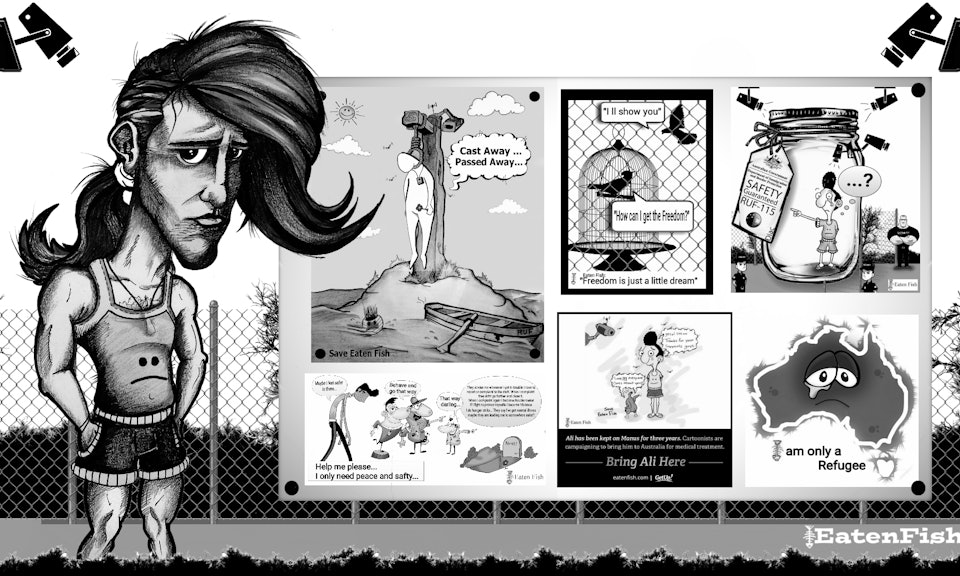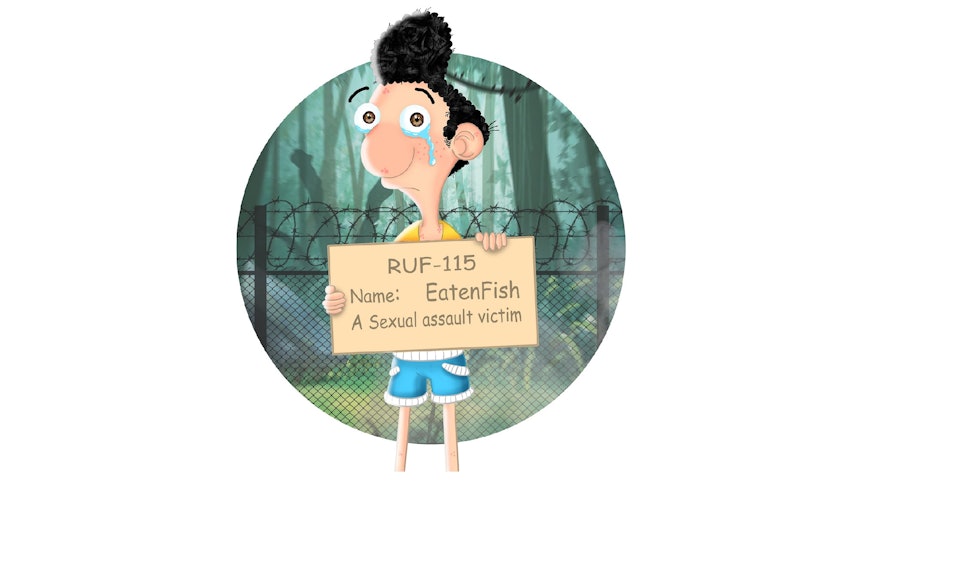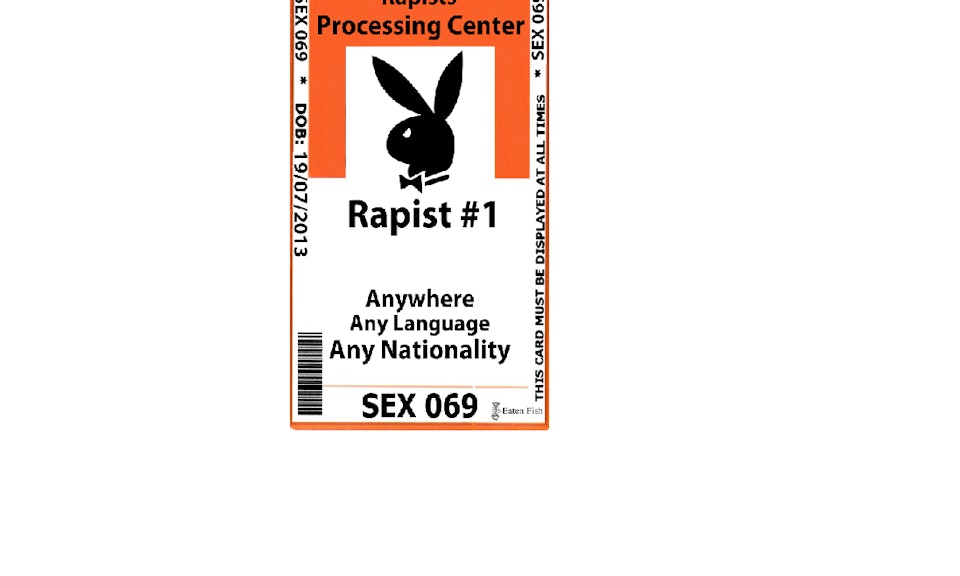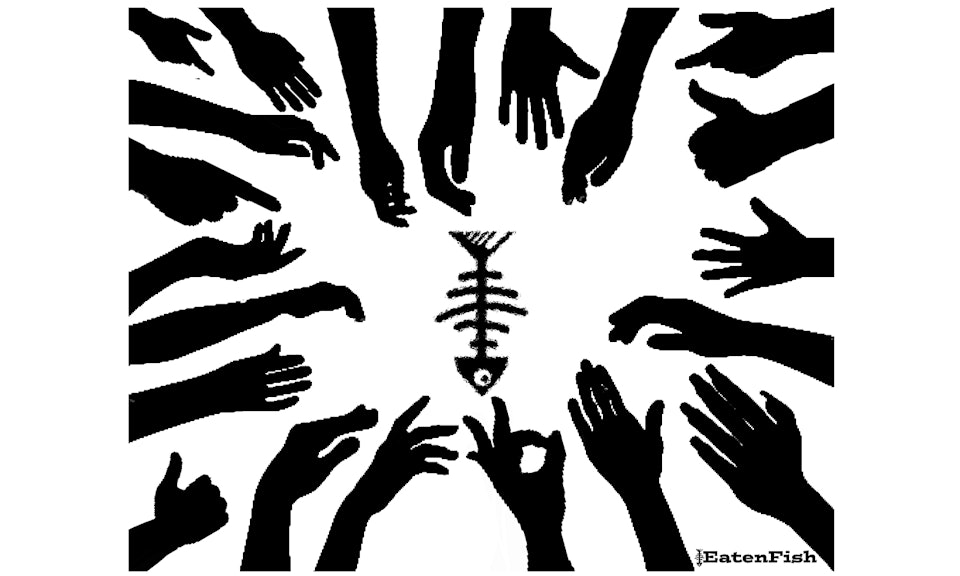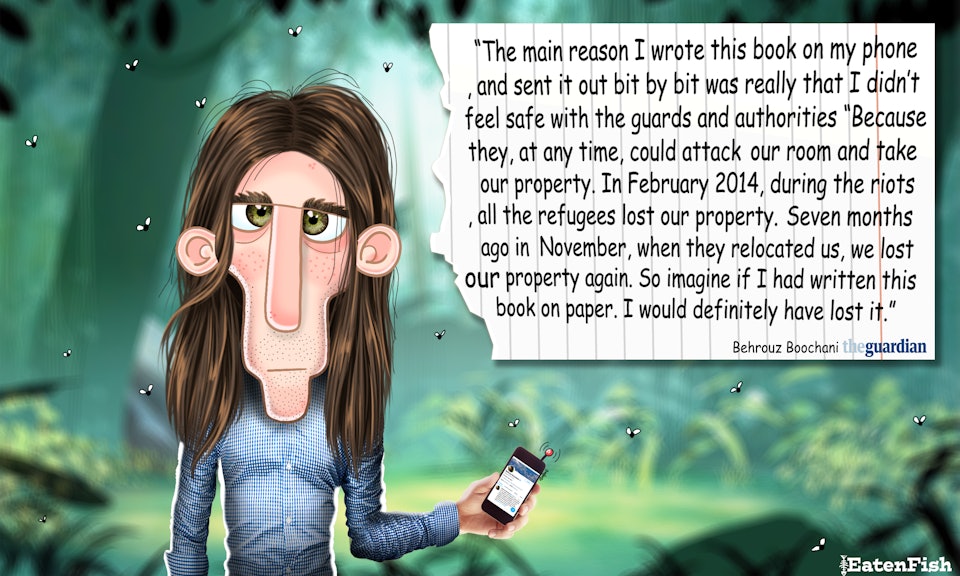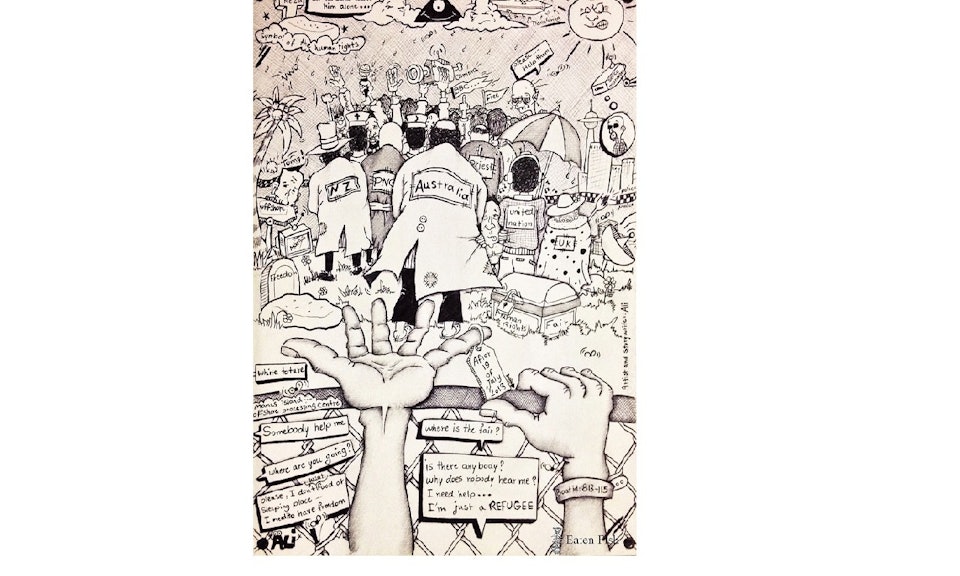Artist Profile
Ali Dorani
Iran
Status: Released

Ali Dorani, an Iranian cartoonist and political activist that goes by pseudonym Eaten Fish, gained global recognition for the cartoons he created while being detained in an Australian-run immigration center on Manus Island for four years. Dorani adopted the pen-name ‘Eaten Fish’ after his boat sank in the Indian Ocean during an attempt to seek asylum in Australia. After the sinking Dorani was saved, but taken into custody as a refugee - first to Christmas Island, then to Manus Island Detention Center, a detention center for asylum seekers.

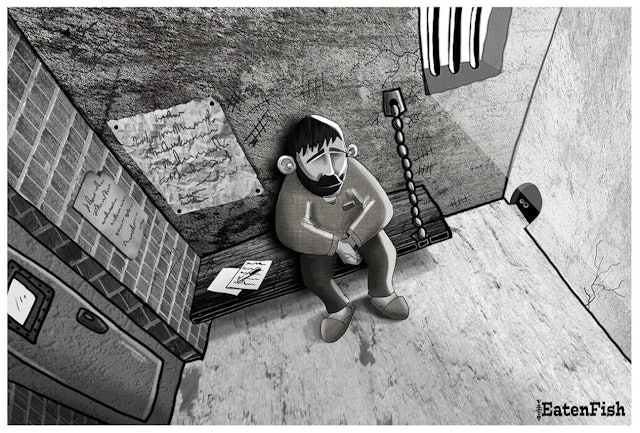
Dorani’s drawings focused on conditions on Manus Island, recording life in the refugee camp, and promoting his case through his work. Thanks to the efforts of the International Cities of Refugees Network (ICORN), almost overnight popularity from numerous awards and a worldwide campaign of tribute drawings, Dorani was eventually granted asylum in Norway where he has been living since 2017.
During his detention on Manus Island, Dorani was a frequent target of guards and other internees. Located in Papua New Guinea, the prison was notorious for rampant human rights violations. The detention center of Manus Island has been condemned by the United Nations and various other human rights groups for highly unsafe conditions, including routine beatings, unsanitary facilities and untimely deaths of refugees in violation of the UN Convention Against Torture, to which Australia is a signatory.
Following the passing of Dorani’s fellow inmate and personal friend Faysal Ishak Ahmed in 2016, Manus refugees staged a non-violent protest, which, according to The Guardian, resulted in a temporary take-over of two camp compounds before guards regained control. The event called into question the ethics of Manus Island staff, and by association, Australian policy towards refugees. During his time in detention and since his release, Dorani has been very vocal about his criticisms of the regulations that controlled life in the detention center. His highly politicized cartoons condemned the Australian government and highlighted the pervasive corruption, sexual harassment, and mistreatment of inmates on Manus.
The detention center experience, as Dorani described, was excruciating. Branded with the booking number “RUF115”, and afflicted with severe obsessive compulsive disorder, post-traumatic stress disorder, and panic attacks, Dorani’s mental health quickly deteriorated. Drawing was his only solace during this dark time, and he worked on his cartoons whenever pen and paper were available. Armed with these tools and his artistic skills, Dorani began his cartoon chronicle, drawing cartoons whenever he could. This attracted the notice of guards and outsiders alike. Dorani’s art, usually depicting a cartoon version of himself living his experiences while at Manus, juxtaposes his prison life with the political circumstances behind the detention camps Australia created. Dorani has made cartoons speaking about the horrid living conditions, his dreams, and of illustrations asking for assistance. One of the outsiders that took notice of Dorani’s plight was cartoonist and The Guardian columnist Andrew Marlton, otherwise known as First Dog on The Moon. The two began communicating as regularly as they could.
Marlton and Dorani became close friends in the years that followed. Through long and deeply personal conversations over text and Facebook Messenger, Marlton came to empathize profoundly with Dorani’s situation. In July of 2016, Marlton published a multi-panel cartoon depicting their correspondence and other details, including Dorani’s health concerns. This communication proved essential when Dorani underwent a 19-day hunger strike from January 31st through February 18th, 2017 in protest against his captors' failure to address his claims of sexual assault. Marlton spoke with Dorani daily during the ordeal.
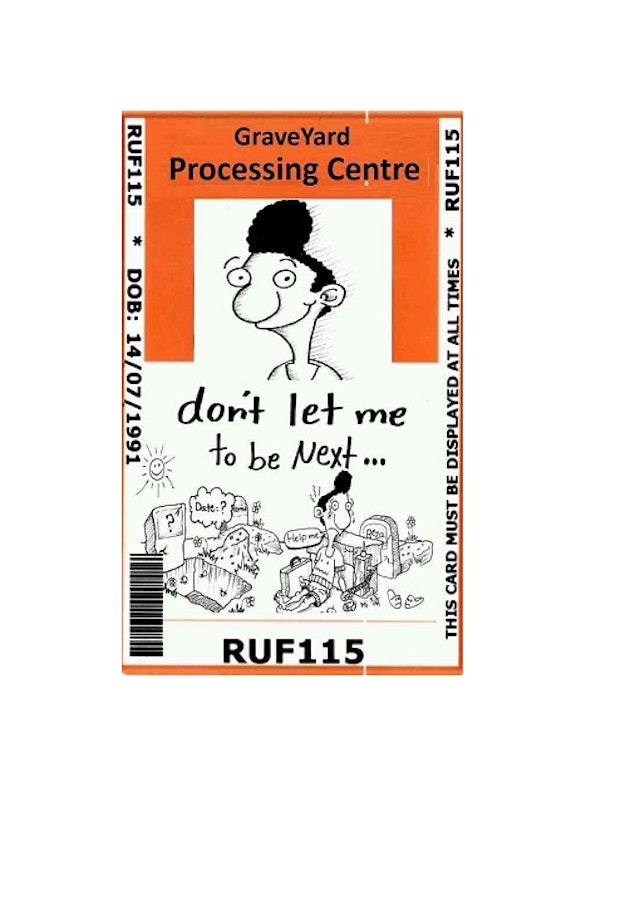
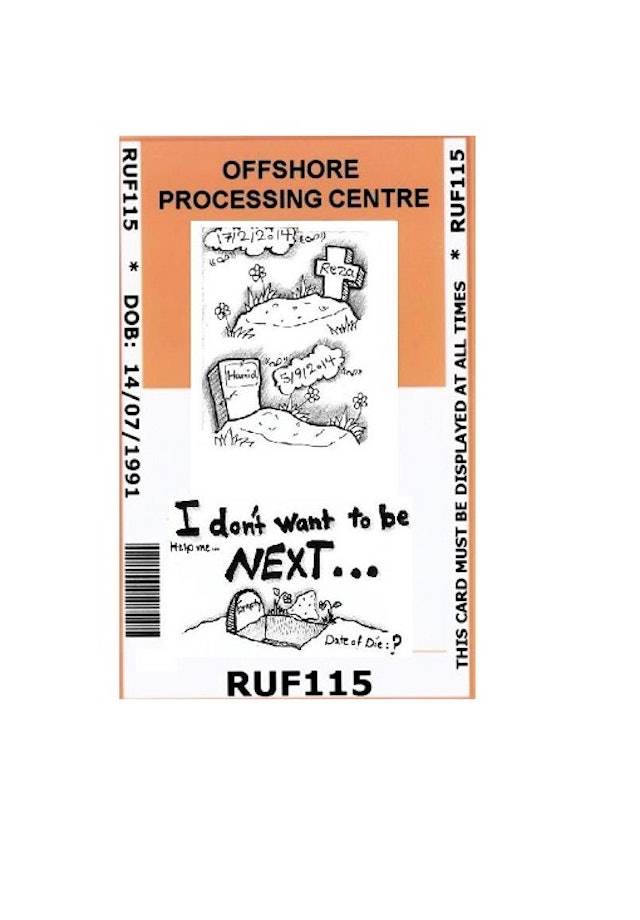
By mid-2016, Dorani had already amassed a huge following advocating for his release. Marlton and Janet Galbraith, a poet and refugee advocate based in Victoria, Australia, created a petition that year for Dorani’s urgent release to mainland Australia for medical treatment. Dorani’s international popularity continued to rise when he received the 2016 Award for Editorial Cartooning by ARC partner Cartoonists Rights Network International (CRNI). Despite winning first place, he was unable to accept the prize in person due to his imprisonment. The urgency was magnified by a series of other freedom of expression organizations based in Australia and worldwide calling for his release, including The International Federation of Journalists (Asia-Pacific), IFEX and Australia’s Media, Entertainment & Arts Alliance (MEAA).

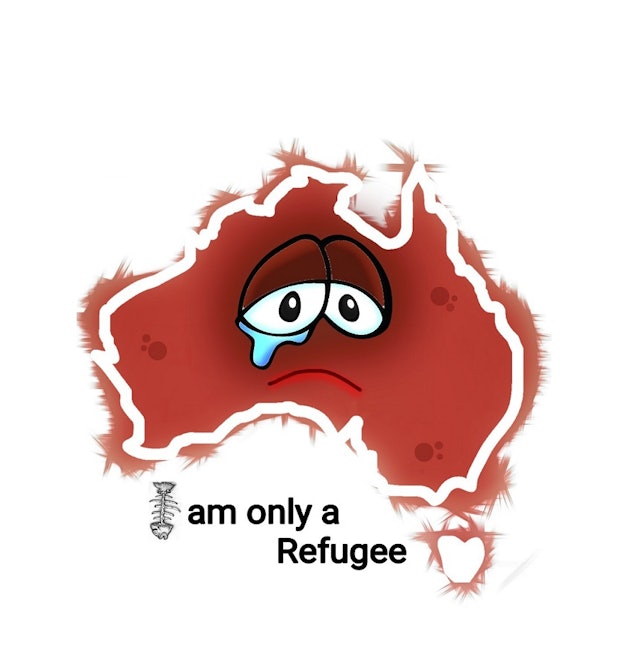
In December of 2017, Dorani was finally granted refuge in Stavanger, Norway through the work of ARC partner ICORN. Since then, Dorani has been looking into more ‘peaceful’ drawing strategies. Or, in his words, "to draw political cartoons freely without criticizing the government"; reflecting his transition into a free life following years of forced internment. Dorani now chooses to focus less on the politically-oriented side of the drawing process, and more on capturing the human aspects of everyday life. Speaking of his current experiences in Stavanger, Dorani stated: “So most of the time, I feel I meet some people, and I see some funny things, and I try to make cartoons and make funny stories out of them.”

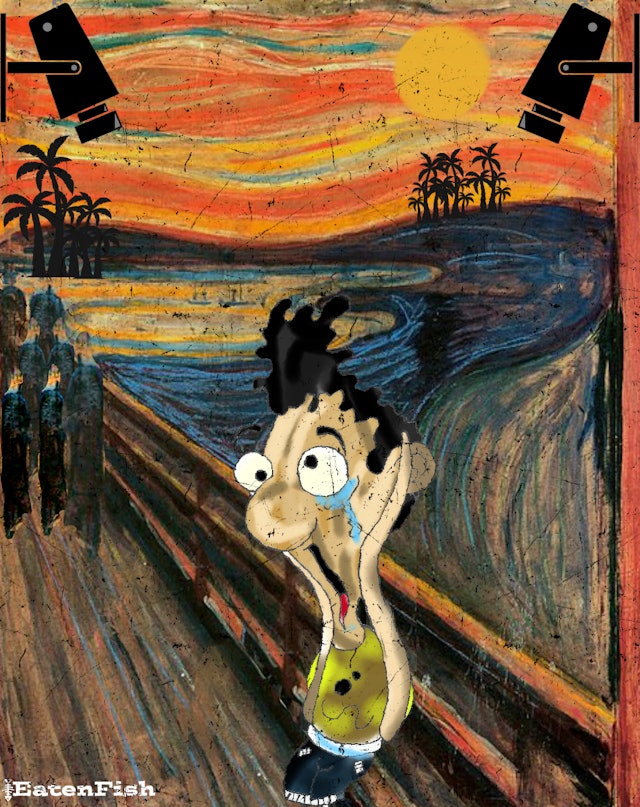
Dorani’s tale is a testament to his perseverance in the face of captivity and dedication to continue his work as an artist despite the risks. In the future, Dorani plans to begin work on filmmaking, as well as continuing to travel across Norway to tell his story.
In 2018, ARC joined CRNI's campaign asking for Dorani's release and was pleased to meet him at the 2018 ICORN General Conference.
By Bageot Dia, April 2019. Bageot was a journalism major, creative writing minor at SUNY Oswego. A recent graduate, he is extremely passionate about geopolitics, philosophy and the sciences.
